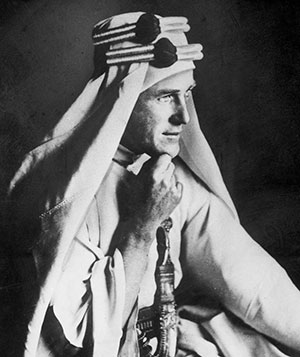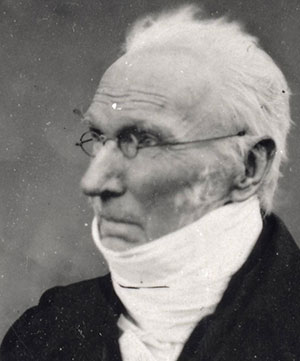ON THIS DAY
Published in Issue 3 (May/June 2020), News, Volume 28BY AODHÁN CREALEY
MAY

Above: ‘Lawrence of Arabia’—his father was in fact Sir Thomas Chapman of South Hill, Delvin, Co. Westmeath.
19/1935
T.E.—Thomas Edward—Lawrence (46), the legendary ‘Lawrence of Arabia’, died as a result of a motorcycle accident in Dorset. For much of his adult life Lawrence was a troubled man. Though his key role in the British-inspired Arab revolt (1916) against Ottoman Turkish rule earned him international celebrity, he was torn by guilt over Britain’s post-war betrayal of the Arabs with the implementation at Versailles of the notorious Sykes–Picot Agreement. Then there was the issue of identity. At the tender age of ten he discovered that his parents were not married, meaning that he and his four brothers were illegitimate. Later he was to learn that ‘Mr Lawrence’, his father, was, in fact, Sir Thomas Chapman of South Hill, Delvin, Co. Westmeath, who, though married with four daughters, had fled with their governess, Sarah Lawrence, first to Wales—where ‘Ned’ was born—and finally to London. He was eventually to find himself increasingly drawn to his father’s homeland. A close friend of George Bernard Shaw and his wife Charlotte—GBS had helped him to edit his major work, Seven pillars of wisdom (1926)—he mentioned his desire in his surviving letters to visit Ireland and often referred to the works of Seán O’Casey, James Joyce and J.M. Synge. Indeed, he hoped to write a biography of Sir Roger Casement. It seems that he never did try to make contact with his half-sisters. In 1954, almost twenty years after his death, some of his old friends visited the two surviving ones, who were living at 39 Northumberland Road, Dublin. They told them that they had followed their half-brother’s career with great interest but likewise had made no attempt to contact him.
02/1920
Revd Professor Walter McDonald (66), theologian at Maynooth College, author of Reminiscences of a Maynooth professor (published posthumously in 1925), died.
05/1980
The Iranian Embassy siege in London ended after five days when the SAS stormed the building, killing all but one of the six members of an Arab terrorist group who had taken 26 people, mainly embassy staff, hostage.
06/1970
Taoiseach Jack Lynch dismissed from cabinet Minister for Finance Charles J. Haughey and Minister for Agriculture Neil Blaney. Minister for Local Government Kevin Boland resigned in sympathy with his two colleagues.
12/1820
Florence Nightingale, social reformer and founder of modern nursing, born in Florence, Italy.
16/1920
A year after the short-lived Limerick Soviet, workers took over Cleeve’s creamery in Knocklong after their wage demands were refused and they were locked out. They handed back control in less than a week.
19/1870
The Home Government Association of Ireland was founded by Isaac Butt with the aim of establishing a federal system for the United Kingdom, which would grant Ireland a parliament responsible for national affairs. Succeeded by the Home Rule League (1873).
21/1980
After the first of their two summits that year, Taoiseach Charles J. Haughey issued a joint communiqué with Margaret Thatcher agreeing that ‘any change in the constitutional status of Northern Ireland would only come about with the consent of the majority of the people of Northern Ireland’.
23/1770
‘The Deserted Village’ (likely the village of Auburn, near Athlone) by Oliver Goldsmith was published.
27/1940
‘Operation Dynamo’, the evacuation of c. 338,000 Belgian, British and French troops over nine days from the beaches and harbour of Dunkirk, began.
28/1970
Former ministers Charles J. Haughey and Neil Blaney, along with Captain Kelly and Albert Luykx, were arrested and charged with conspiring to import arms and ammunition into the state.
JUNE

Above: Patrick Bronte—tragically outlived all his children.
06/1861
Patrick Bronte (84), clergyman, poet and social campaigner, died. By the time he reached his mid-70s, Bronte was a lonely widower in failing health, who had lost most of his family—first his wife, Maria, followed four years later by his daughters Maria (11) and Elizabeth (10), and then, over just an eight-month period, his son Branwell (31) and his daughters Emily (30) and Anne (29). Nevertheless, there was some consolation. He still had Charlotte and the satisfaction of seeing her achieve literary fame after the publication of Jane Eyre (1847) and Villette (1853), and, indeed, the posthumous recognition of both Emily and Anne. His delight was short-lived, however. In December 1852 Charlotte announced her wish to marry his curate, Arthur Nicholls. Little wonder that he strongly objected. Apart from any other considerations, he feared that she would not have the strength for childbirth, but he relented and his fears were confirmed. She died within a year of her marriage, along with her unborn child, from an acute form of morning sickness at the age of 38. Thereafter, until his death, his parish duties fell mainly to Nicholls, though he continued to visit the poor and the sick, and successfully concluded a campaign to get a clean water supply for the village. As for Arthur Nicholls, he hoped to succeed Bronte as rector of Haworth but was turned down by the parish guardians, probably because he had no independent means. He returned to Banagher, Co. Offaly, where he had been reared by an uncle, married his cousin and lived out his years in genteel poverty as a small farmer. He made no attempt to secure another clerical appointment and died, aged 87, in 1906.
03/1970
Former minister Kevin Boland was expelled from the Fianna Fáil parliamentary party following his refusal to withdraw remarks about Taoiseach Jack Lynch’s ‘unparalleled treachery’.
04/1820
Henry Grattan (74), politician and orator who unsuccessfully introduced a bill for Catholic Emancipation in the Irish parliament (1794), died.
05/1920
Cornelius Ryan, war correspondent and author, notably of the best-seller The longest day (1959), which became a film that set box-office records, born in Dublin.
7/1970
Dr Owen Sheehy-Skeffington (61), humanist and academic, died.
15/1920
RIC District Inspector Percival Lea-Wilson was shot dead by the IRA in Gorey, Co. Wexford.
16/1920
In what became known as the ‘Listowel mutiny’, Constable Jeremiah Mee and a number of fellow officers refused orders to hand over Listowel RIC barracks to military control and accept more dangerous assignments in outlying barracks.
19/1870
Charles Dickens (58), regarded as the greatest novelist of the Victorian era, died.
25/1870
(Robert) Erskine Childers, Sinn Féin politician and author of The riddle of the sands (1903), born in London but raised at the maternal home, Glendalough House, Co. Wicklow, along with his cousin, Robert Childers Barton (1881–1975)
25/1970
The Catholic hierarchy lifted the ban on Catholics attending Trinity College, Dublin.
27/1970
After serious sectarian clashes in the north of the city that afternoon, which left three Protestants dead, the Provisional IRA, in action for the first time, engaged in a five-hour gun battle with loyalists in the Short Strand area. Three men, two Protestant and one Catholic, died.
28/1920
Members of ‘B’ and ‘C’ Companies of the 1st Battalion of the Connaught Rangers, quartered in Jullundur, Punjab, refused to soldier because of reports reaching them of atrocities being committed in Ireland by members of the Black and Tans and Auxiliaries.
















